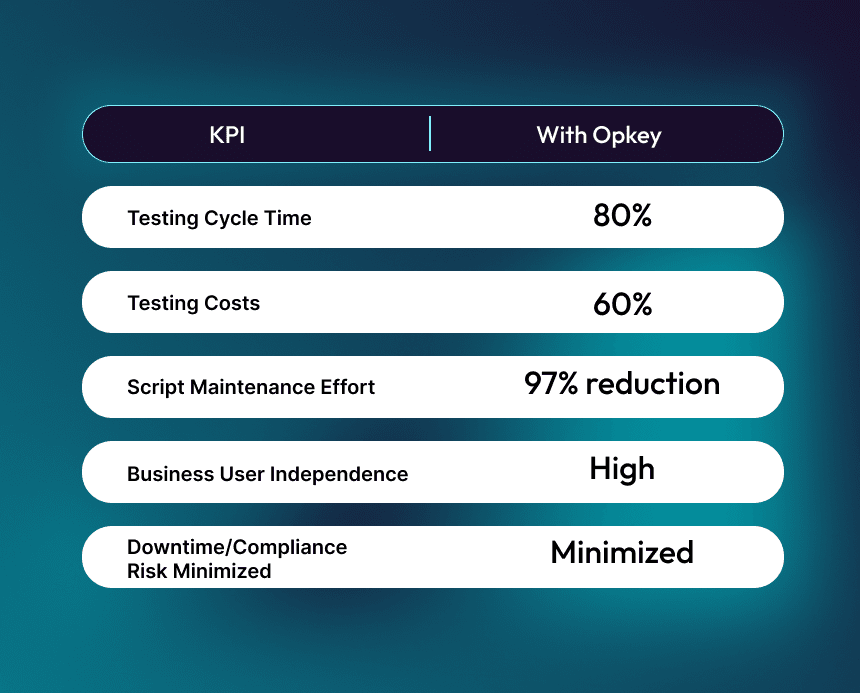Introduction: Modern Workday Challenges in Construction
Today’s construction and infrastructure leaders operate in an environment of constant change. That involves global teams, evolving regulations, and ever-shifting business demands. For a construction company with 13,000+ employees and $6B+ in revenue, this complexity directly impacts the management of its digital backbone: Workday.
Workday is the system that powers HR, payroll, benefits, and more. As critical integrations (to, SAP FICO, for example) have expanded, manual testing approaches could not keep up, causing delays, compliance risks, and operational slowdowns.
This is how Opkey’s agentic AI test automation platform empowered a construction giant to automate and optimize its Workday testing, accelerating its digital transformation.
Facing the Storm: Manual Workday Testing Hits Its Limit
Despite investing in digital transformation, the company’s Workday and SAP testing processes created several pain points:
- Testing Silos: Updates in Workday or SAP demanded siloed, manual testing.
- Resource Drain: Maintaining Selenium-based scripts was a burden. Business users depended on IT for every update.
- Uncertain Test Coverage: Determining affected business processes was a guessing game, risking downtime and compliance issues.
- User Burnout: Manual User Acceptance Testing (UAT) caused fatigue and errors.
To overcome these hurdles, the organization sought an automation platform that could:
- Automatically analyze the impact of updates.
- Empower business users to run tests themselves.
- Cut testing costs and timelines.
- Guarantee regulatory compliance and reduce risk.
Enter Opkey: Agentic AI for Workday Automation
The company adopted Opkey’s no-code, AI-powered platform to transform its Workday testing. Here’s how Opkey delivered success:
- AI-Driven Impact Analysis: Opkey’s Impact Analysis scans every update and configuration change, pinpointing the exact workflows and business processes impacted. This allowed risk-based, targeted testing, putting an end to guesswork.
- No-Code, Self-Service Automation: With a no-code platform, business users could create, run, and maintain automated test scripts without IT intervention. Test automation became accessible across the organization.
- Pre-Built Workday Test Library: Opkey provided access to a pre-built library of over 1,000 automated Workday tests. This drastically reduced ramp-up for regression and integration testing across core modules.
- Self-Healing Technology: Traditional test scripts break as enterprise apps evolve. Opkey’s self-healing scripts automatically adapt to application changes, reducing test maintenance by 97%.
- True End-to-End Testing: Validation now spanned Workday and SAP in one seamless experience, eliminating tool proliferation and ensuring integration testing best practices.
- QLM Test Management: Opkey’s Quality Lifecycle Management (QLM) platform delivered end-to-end traceability of testing operations, ensuring consistent processes, reporting, and visibility across teams.
- Automated User Acceptance Testing: With automated UAT, business users saved countless hours of repetitive manual effort, minimizing human error and accelerating adoption.
- Process Intelligence: Leveraging AI-powered test discovery, Opkey identifies gaps in coverage and recommends priority tests, enabling data-driven test management and continuous improvement.
- Continuous Integration Enabled: The platform supports CI/CD integrations, making test automation part of agile delivery and development pipelines.
Quantifiable Impact: The Results That Matter

After implementing Opkey, this construction giant achieved transformative business outcomes:
- Testing cycles were shortened by 80%.
- Testing costs dropped by 60%.
- Test maintenance effort decreased by 97%.
- Business users independently managed testing cycles.
- Security and compliance strengthened across HR, payroll, and self-service workflows.
Beyond Speed: Real-World Business Benefits
The ripple effects of autonomous Workday testing delivered even greater value:
- Faster, Safer Updates: Deliver critical supported enterprise application updates quickly, without jeopardizing integrations or compliance.
- Unlock Innovation: IT teams focus on higher-value projects, freeing themselves from repetitive testing maintenance.
- Business User Empowerment: No-code testing put power in the hands of those closest to business operations.
- Continuous Compliance: Automated risk-based testing ensures every update meets regulatory, payroll, and security standards.
Key Takeaways for CIOs and CISOs
Organizations relying on Workday to drive business need to recognize:
- Manual testing can’t keep up with the speed or complexity of ERP environments.
- AI-driven automation delivers smarter, targeted test coverage and rapid business agility.
- No-code platforms let business experts—not just IT—manage risk and maximize agility.
- Self-healing automation removes the old barriers of script breakage and costly maintenance.
Conclusion
By modernizing its Workday management, this global construction leader accelerated releases, reduced operational cost, and empowered its teams. In an industry where every compliance failure or delay can cost millions, this approach is a blueprint for success.


